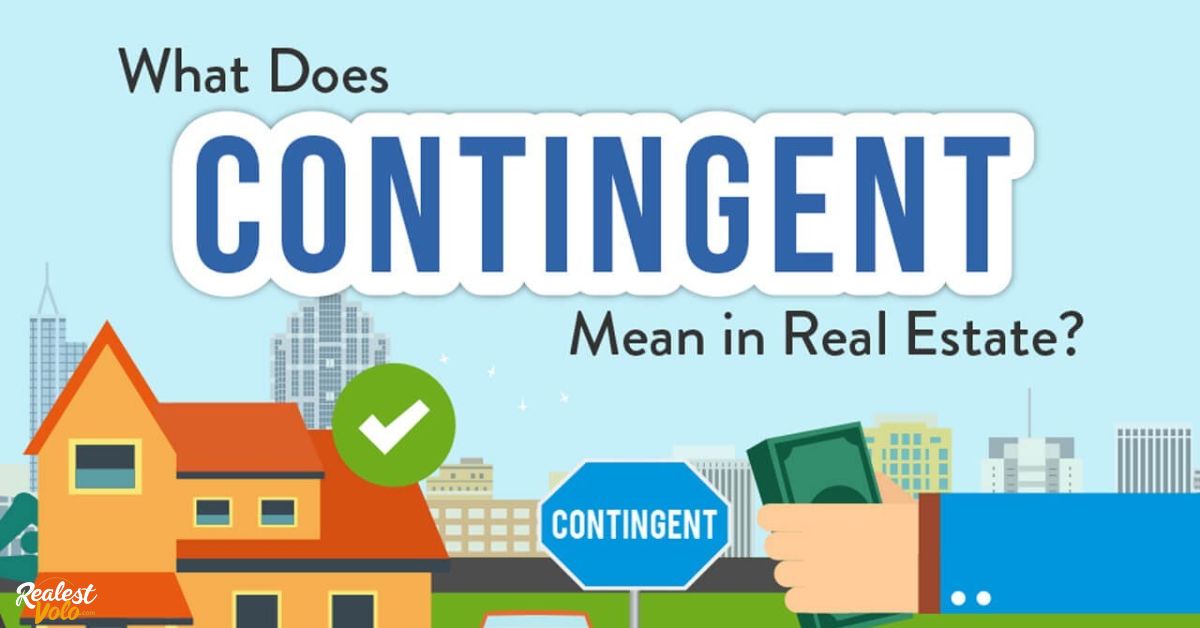In the dynamic world of real estate transactions, the term contingent carries significant weight, often sparking curiosity and prompting questions among buyers, sellers, and even seasoned agents. So, what exactly does “contingent” mean in the realm of real estate? Simply put, a contingent offer refers to a situation where a buyer has made an offer on a property, but certain conditions must be met for the sale to proceed smoothly.
These conditions can vary widely, ranging from financing approvals and home inspections to the sale of the buyer’s current property. Understanding the nuances of contingent offers is crucial for all parties involved in a real estate transaction, as they can impact timelines, negotiations, and overall deal dynamics.
What Does “Contingent” Mean in Real Estate?
In the intricate landscape of real estate, the term “contingent” holds significant implications for both buyers and sellers alike. A contingent offer signifies that a buyer has submitted an offer on a property, but its fulfillment is subject to specific conditions being met.
These conditions typically revolve around aspects such as financing approval, home inspections, or the sale of the buyer’s current property. Understanding the nuances of contingent offers is essential for navigating the complexities of real estate transactions effectively.
How Does Including A Contingency Protect Buyers?

Here’s how including a contingency can benefit buyers:
- Flexibility: Contingencies provide flexibility for buyers to address unexpected issues that may arise during the purchasing process.
- Time to Secure Financing: Contingencies related to financing give buyers time to secure a mortgage loan that meets their needs and budget.
- Peace of Mind: Knowing that contingencies are in place can offer buyers peace of mind, reducing stress and uncertainty throughout the transaction.
- Negotiation Power: Contingencies can give buyers leverage during negotiations, allowing them to request repairs or adjustments based on inspection findings.
- Protection Against Unexpected Events: Contingencies protect buyers from unforeseen circumstances that may affect their ability to proceed with the purchase, such as job loss or changes in personal circumstances.
8 Common Real Estate Contingencies
In real estate transactions, contingencies play a pivotal role in safeguarding the interests of both buyers and sellers. These contractual provisions outline specific conditions that must be met for the sale to proceed smoothly.
Here are eight common contingencies encountered in real estate deals:
Disclosure Contingency
This contingency ensures that the seller provides comprehensive disclosure of any known issues or defects with the property. It gives the buyer the opportunity to review and assess the disclosed information before proceeding with the purchase.
Home Inspection Contingency
A home inspection contingency allows the buyer to conduct a thorough inspection of the property by a qualified inspector. It provides an opportunity to uncover any hidden issues or structural concerns that may affect the decision to proceed with the purchase.
Appraisal Contingency
An appraisal contingency is designed to protect the buyer by ensuring that the property is valued at or above the agreed-upon purchase price. If the appraisal comes in lower than expected, the buyer may have the option to renegotiate the price or withdraw from the transaction.
Mortgage Contingency
This contingency makes the purchase offer contingent upon the buyer securing financing from a lender within a specified timeframe. It provides protection to the buyer in case they are unable to obtain a mortgage loan, allowing them to back out of the deal without penalty.
Title Contingency
A title contingency ensures that the property has a clear title, free of any liens or legal encumbrances. It allows the buyer to review the title report and address any issues before finalizing the purchase.
Home Sale Contingency
For buyers who need to sell their current home before purchasing a new one, a home sale contingency allows them to make their purchase offer contingent upon the sale of their existing property. It provides flexibility and peace of mind during the transition between homes.
Homeowners Insurance Contingency
This contingency requires the buyer to secure homeowners insurance for the property before the sale can be completed. It ensures that the property is adequately protected against potential risks and liabilities.
Homeowners Association Contingency
In communities governed by homeowners associations (HOAs), this contingency allows the buyer to review the HOA’s rules, regulations, and financial health before committing to the purchase. It ensures that the buyer is aware of any potential obligations or restrictions associated with the property.
What is an Example of Contingent?

In this case, if the buyer fails to secure the necessary financing within the specified period, the offer may become null and void, allowing either party to withdraw from the transaction without penalty. This example illustrates how contingencies serve to protect the interests of both buyers and sellers by ensuring that certain conditions are met before finalizing the sale of a property.
Contingent Status Types
In the realm of real estate, understanding the various status types associated with contingent properties is essential for both buyers and sellers. Here’s an overview of the different contingent status types you may encounter:
Contingent
Properties labeled as “Contingent” signify that an offer has been made on the property, but certain conditions or contingencies must be fulfilled before the sale can proceed. These conditions typically include tasks such as home inspections, appraisal, or the buyer securing financing. During this stage, the property is still considered available for backup offers.
Active Contingent
Active Contingent” status indicates that the property is under contract, but the seller is actively soliciting backup offers. This status is often seen when the initial offer is contingent upon specific conditions, such as the buyer selling their current home or obtaining financing within a designated time frame.
Contingent With Kick-Out
In situations where the seller has accepted an offer contingent upon the buyer selling their current home within a specified period, the property is labeled as “Contingent With Kick-Out.” This status gives the seller the option to “kick out” the current buyer if a better offer is presented, typically within a specified timeframe.
Contingent Probate
When a property is part of a probate estate, meaning it is being sold as part of the probate process following the owner’s death, it is marked as “Contingent Probate.” The sale of such properties is subject to court confirmation, adding an additional layer of oversight to the transaction.
Short-Sale Contingent
“Short-Sale Contingent” status indicates that the property is being sold for less than the amount owed on the mortgage, and the sale is contingent upon approval from the lender. This process can be prolonged as it involves negotiations with the lender to accept less than what is owed on the loan.
Pending
When all contingencies have been met or waived, the property status changes to “Pending.” At this stage, the sale is in its final stages, awaiting the closing process. Pending status signifies that the transaction is well on its way to completion, with all major hurdles overcome.
Pending – Over Four Months
Properties marked as “Pending – Over Four Months” have been under contract for more than four months without closing. This extended period in the pending status may raise questions or concerns about potential issues with the transaction, financing, or other complications that have delayed the closing process. Further investigation may be warranted to understand the reasons for the prolonged pending status.
What’s the Difference Between Contingent and Pending?

Contingent Status
A property labeled as “contingent” typically indicates that an offer has been made by a buyer, but certain conditions must be met before the sale can proceed. These conditions may include home inspections, financing approval, or the sale of the buyer’s current home. Until these contingencies are satisfied, the property remains active on the market, albeit with a contingent status.
Pending Status
On the other hand, when a property is marked as “pending,” it signifies that all contingencies have been successfully met or waived, and the transaction is in the final stages of completion. The sale is essentially pending final closure, such as the transfer of funds and legal paperwork, and the property is no longer actively marketed.
Understanding these distinctions can help both buyers and sellers navigate the real estate landscape with clarity and confidence.
Frequently Asked Question
What Does Contingent Mean In Real Estate?
In real estate, contingent means that an offer has been made on a property, but certain conditions must be met for the sale to proceed.
What Are Common Contingencies In A Real Estate Transaction?
Common contingencies include financing approval, home inspections, appraisal, and the sale of the buyer’s current property.
Can A Contingent Offer Fall Through?
Yes, a contingent offer can fall through if the specified conditions are not met within the agreed-upon timeframe.
How long does a contingent offer last?
The duration of a contingent offer varies and is typically outlined in the purchase contract. It may range from a few days to several weeks.
Can A Seller Accept Another Offer While Under Contingent Status?
While a property is under contingent status, the seller may continue to entertain other offers, but they are typically subject to a “kick-out clause,” allowing the seller to accept a better offer if one arises and the initial buyer fails to meet their contingencies.
Final Words
In real estate, “contingent” signifies an offer on a property subject to specific conditions. These conditions typically include factors like financing approval, home inspections, and appraisal. Should these conditions not be met within the stipulated time frame, the offer may be voided.
Sellers might continue to consider other offers during this period, but often with a “kick-out clause” allowing them to accept a better offer if the initial buyer fails to fulfill their contingencies. For buyers, understanding contingent offers is essential, as it affects the process’s timeline and negotiation dynamics.
Sellers need to comprehend contingent offers to manage their expectations and evaluate potential risks during the transaction. Overall, grasping the concept of contingency in real estate transactions is vital for all parties involved to navigate the process effectively.











